Ferdinand Foch Worksheets
Do you want to save dozens of hours in time? Get your evenings and weekends back? Be able to teach about Ferdinand Foch to your students?
Our worksheet bundle includes a fact file and printable worksheets and student activities. Perfect for both the classroom and homeschooling!
Resource Examples
Click any of the example images below to view a larger version.
Fact File
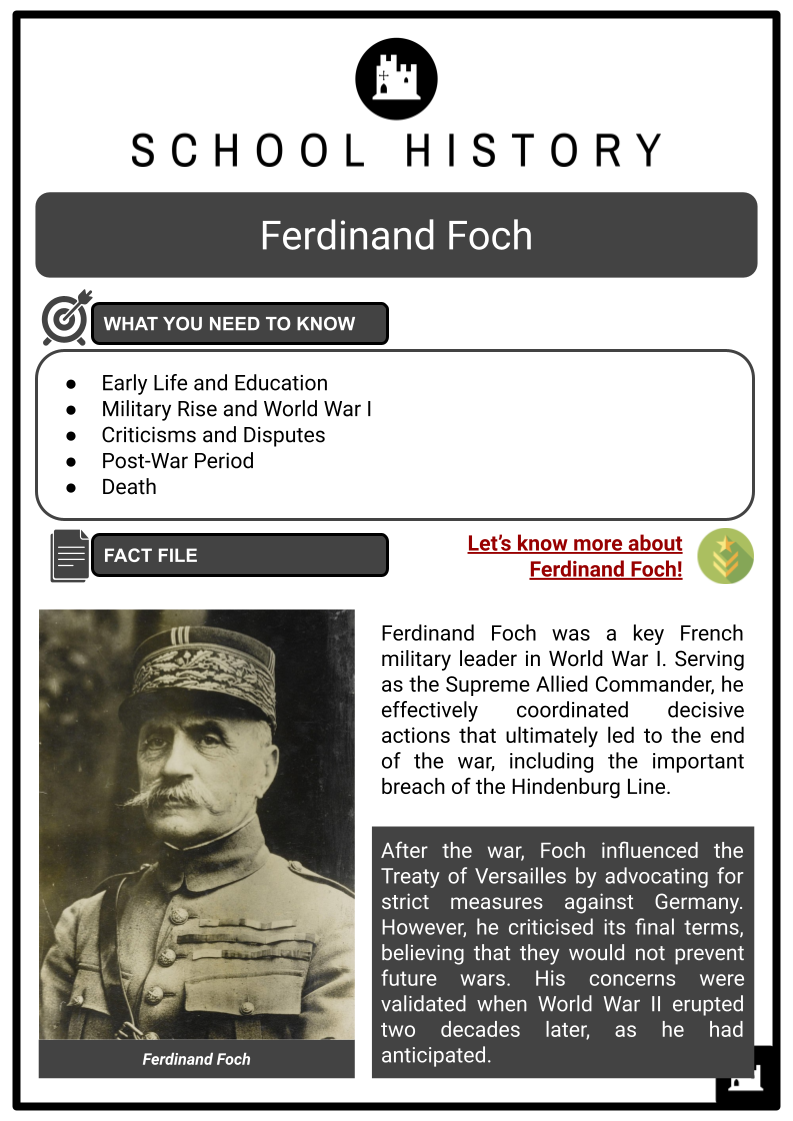
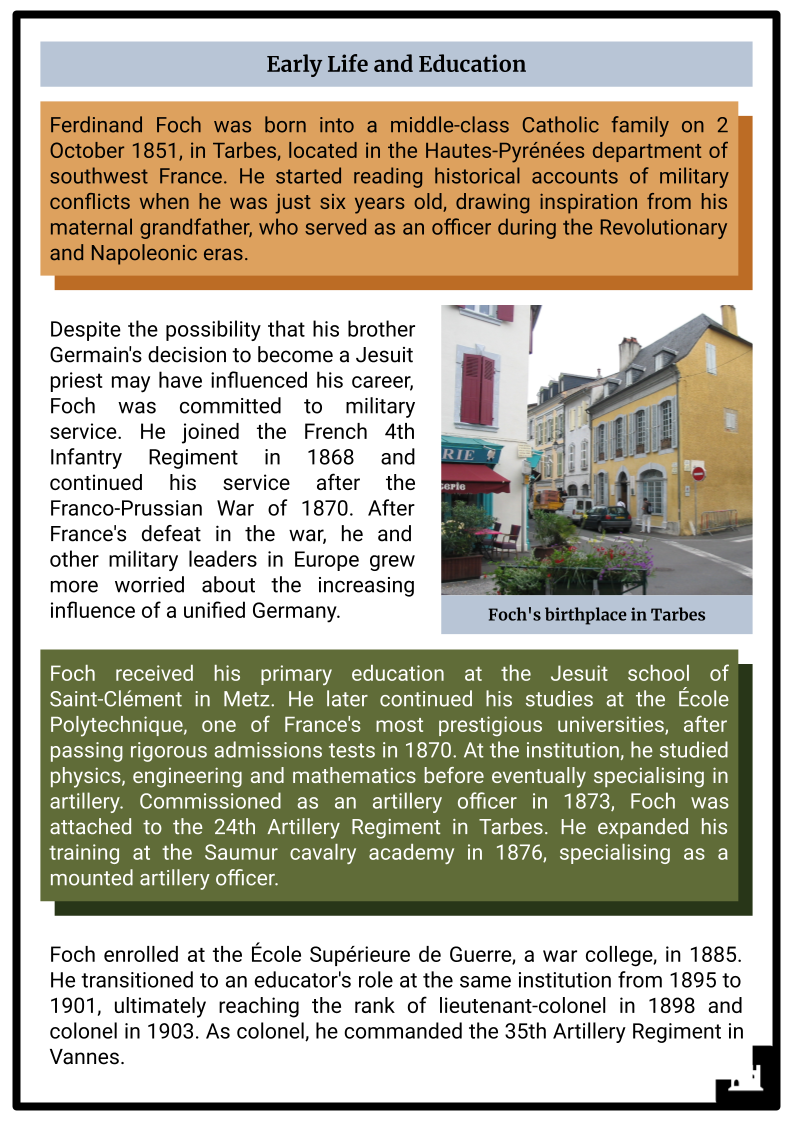
Student Activities
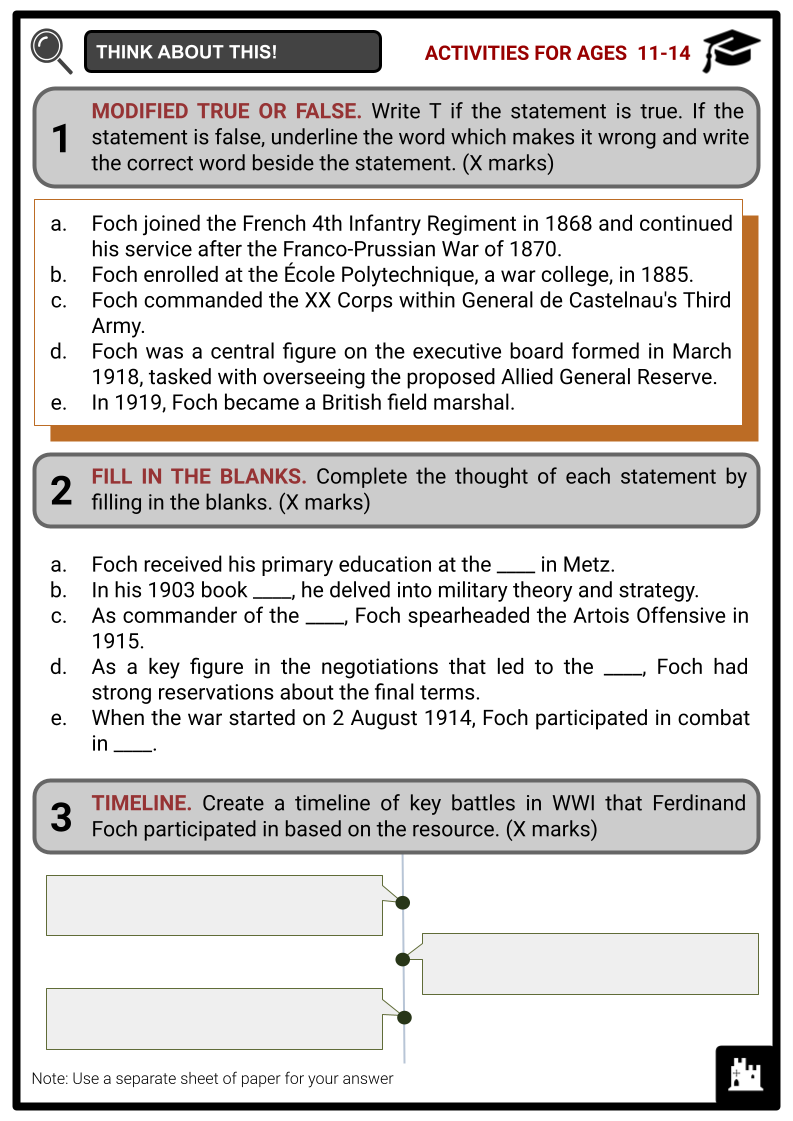
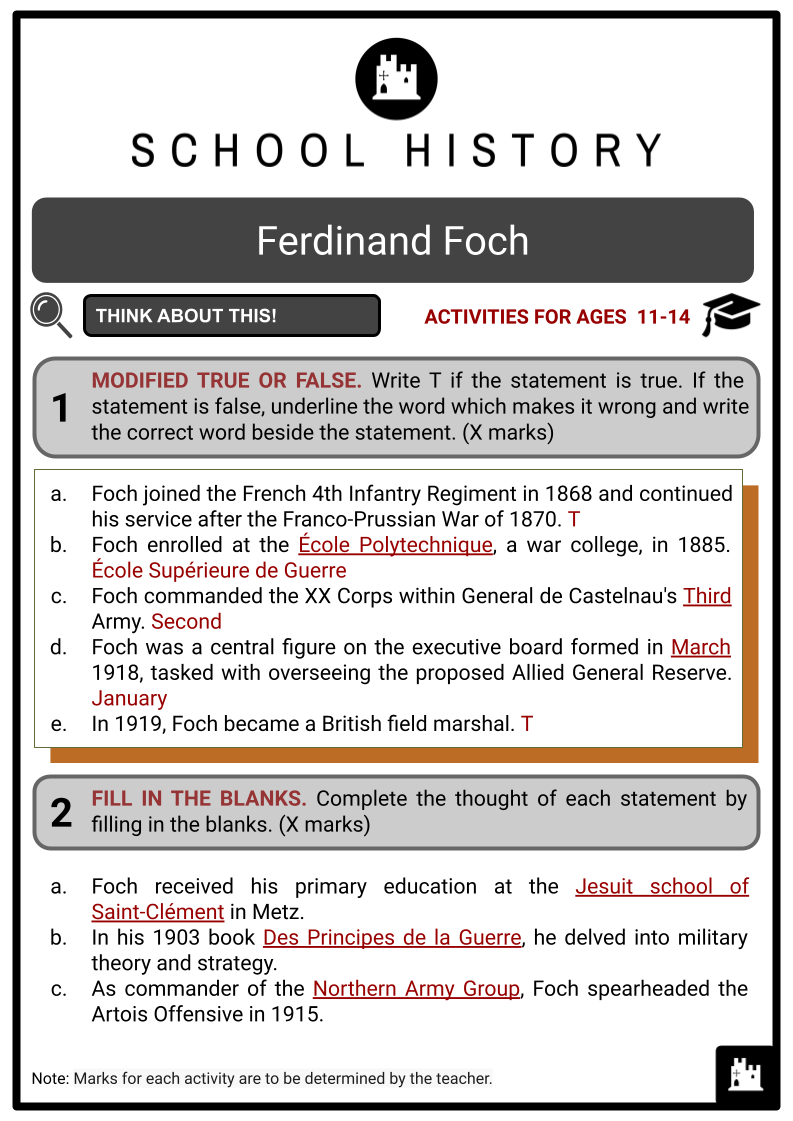
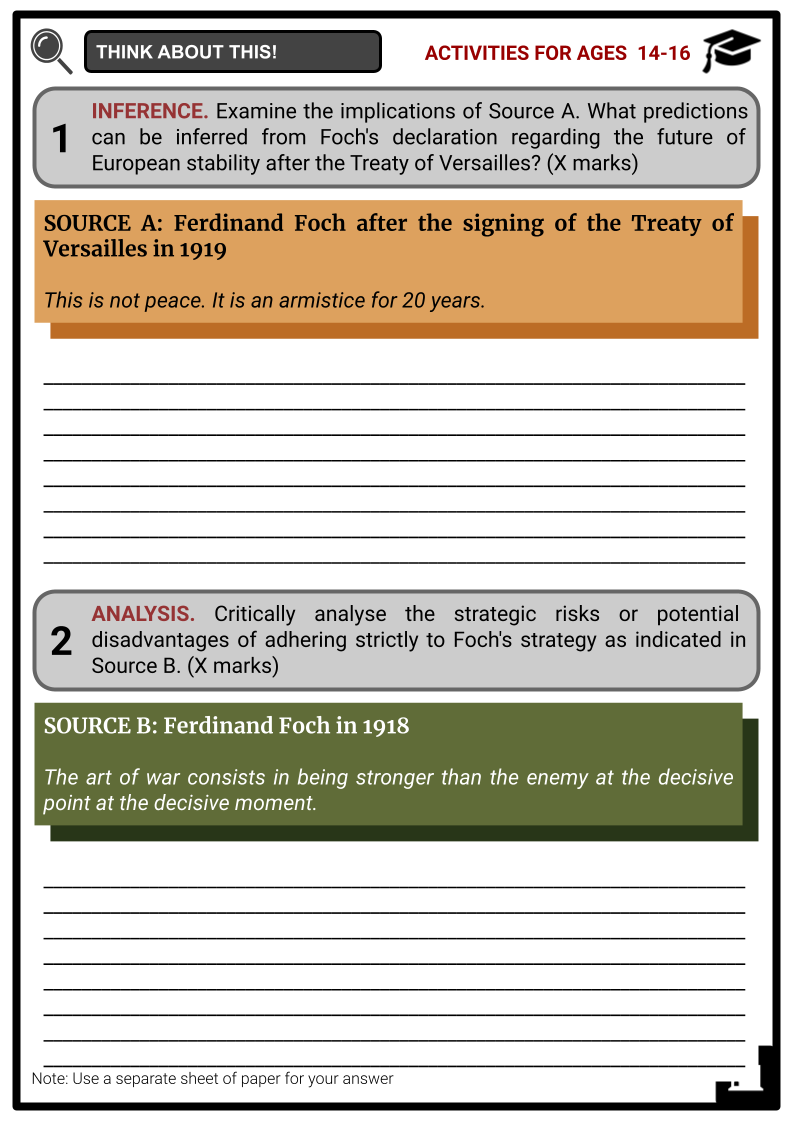
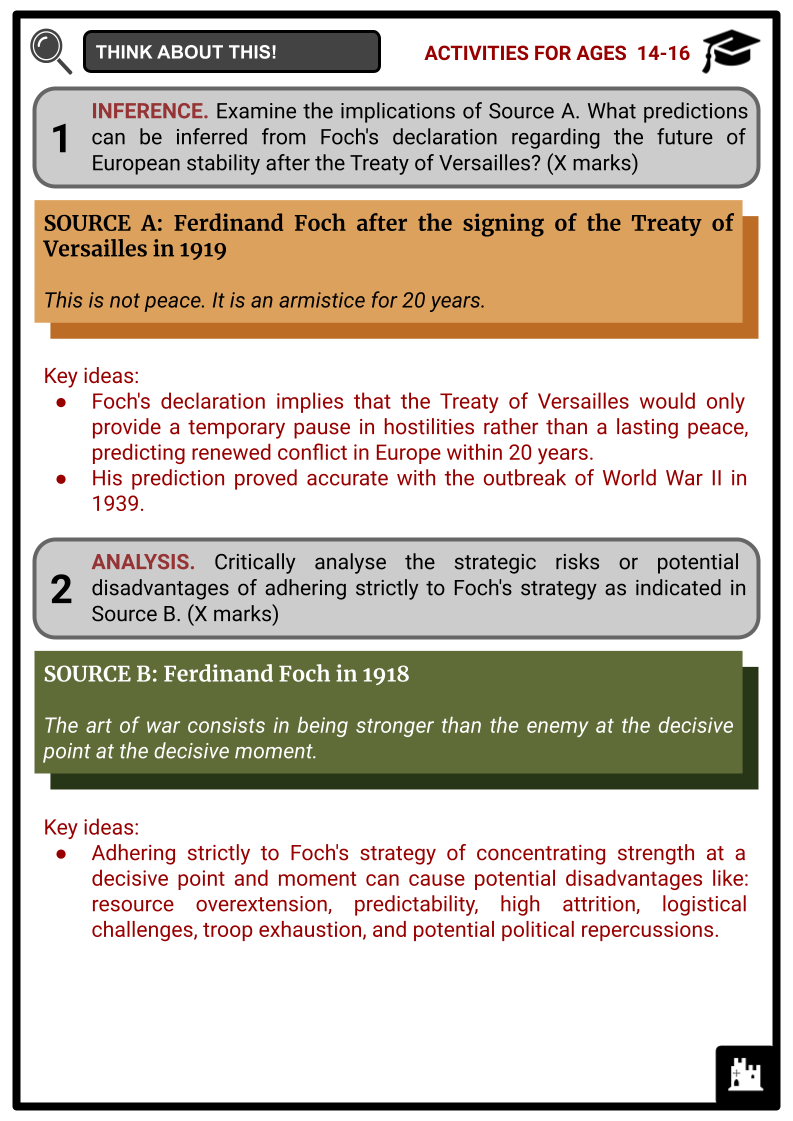
Summary
- Early Life and Education
- Military Rise and World War I
- Criticisms and Disputes
- Post-War Period
- Death
Key Facts And Information
Let’s know more about Ferdinand Foch!
Ferdinand Foch was a key French military leader in World War I. Serving as the Supreme Allied Commander, he effectively coordinated decisive actions that ultimately led to the end of the war, including the important breach of the Hindenburg Line. After the war, Foch influenced the Treaty of Versailles by advocating for strict measures against Germany. However, he criticised its final terms, believing that they would not prevent future wars. His concerns were validated when World War II erupted two decades later, as he had anticipated.
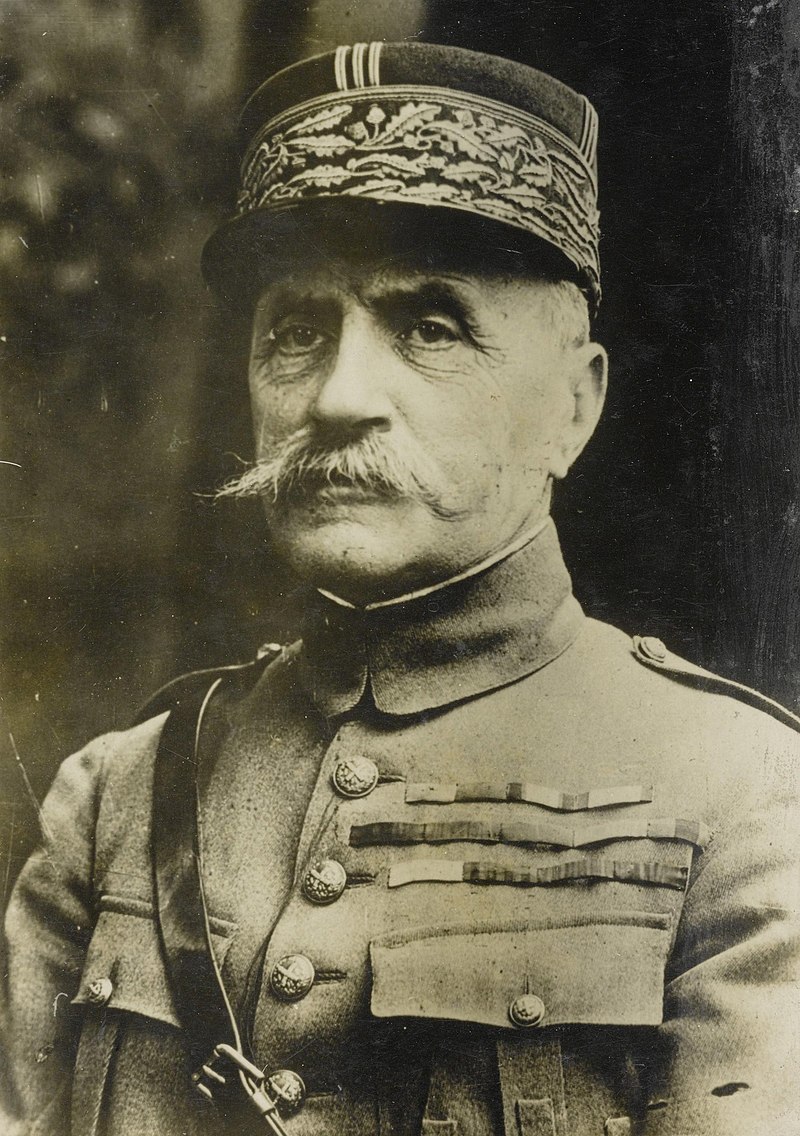
Early Life and Education
- Ferdinand Foch was born into a middle-class Catholic family on 2 October 1851, in Tarbes, located in the Hautes-Pyrénées department of southwest France. He started reading historical accounts of military conflicts when he was just six years old, drawing inspiration from his maternal grandfather, who served as an officer during the Revolutionary and Napoleonic eras.
- Despite the possibility that his brother Germain's decision to become a Jesuit priest may have influenced his career, Foch was committed to military service. He joined the French 4th Infantry Regiment in 1868 and continued his service after the Franco-Prussian War of 1870. After France's defeat in the war, he and other military leaders in Europe grew more worried about the increasing influence of a unified Germany.
- Foch received his primary education at the Jesuit school of Saint-Clément in Metz. He later continued his studies at the École Polytechnique, one of France's most prestigious universities, after passing rigorous admissions tests in 1870.
- At the institution, he studied physics, engineering and mathematics before eventually specialising in artillery. Commissioned as an artillery officer in 1873, Foch was attached to the 24th Artillery Regiment in Tarbes. He expanded his training at the Saumur cavalry academy in 1876, specialising as a mounted artillery officer.
- Foch enrolled at the École Supérieure de Guerre, a war college, in 1885. He transitioned to an educator's role at the same institution from 1895 to 1901, ultimately reaching the rank of lieutenant-colonel in 1898 and colonel in 1903. As colonel, he commanded the 35th Artillery Regiment in Vannes.
- In his 1903 book Des Principes de la Guerre (On the Principles of War), he delved into military theory and strategy, while his 1904 work De la Conduite de la Guerre (On the Conduct of War) demonstrated his deep respect for Napoleonic military theory. When he was a Général de Brigade in 1908, Prime Minister Georges Clemenceau appointed him as head of the war college. His influence notably extended to General Joseph Joffre during the creation of the 1913 French war plan.
Military Rise and World War I
Foch rose through the military ranks due to his strategic skills and leadership abilities, establishing himself as a highly respected commander during World War I.
Some Key Battles of WWI that Foch Participated in:
-
- 7–23 August 1914: Battle of the Frontiers
- 5–12 August 1914: Battle of the Marne
- October–November 1914: Battles of Yser and Ypres
- 1 July–18 November 1916: Battle of the Somme
- 8 August–11 November 1918: Hundred Days Offensive
1914
- When the war started on 2 August 1914, Foch participated in combat in Lorraine. Later, on 28 August, Joseph Joffre, who was the overall commander, instructed Foch to take charge of the emerging army detachment that was forming in that area.
- Foch commanded the XX Corps within General de Castelnau's Second Army. His corps participated in the initial phase of the Battle of the Frontiers, experiencing substantial casualties and engaging in a retreat. However, Foch skillfully managed the situation during the withdrawal to Nancy and through the Charmes Gap and successfully launched a counteroffensive, which effectively stopped the German progression across the River Meurthe and bolstered his reputation.
- In the Battle of the Marne, Foch led defensive manoeuvres to stop a German breakthrough. His perseverance helped Joffre win the battle. At the battles of the Yser and Ypres, Joffre dispatched him to coordinate the English, French and Belgians, who were under attack. It was after these critical actions that he was selected to lead the Ninth Army.
- In October, he was appointed Assistant Commander-in-Chief of the Northern Zone under Joffre due to his successful counter offensives. This stabilised the Allied position and halted the German offensive. In recognition of his leadership and contributions, King George V honoured Foch with an appointment as an Honorary Knight Grand Cross of the Order of the Bath on 2 December.
1915-1916
- As commander of the Northern Army Group, Foch spearheaded the Artois Offensive in 1915. The offensive aimed to break through the heavily fortified German lines and push towards key objectives. He meticulously planned the assault, coordinating artillery bombardments and infantry attacks to weaken the enemy's defences.
- In 1916, Foch demonstrated his strategic leadership by commanding the French forces at the Battle of the Somme. He coordinated and led planning for this major Allied offensive, ensuring effective coordination between British and French forces. Foch's strategy exhibited meticulous planning and a thorough understanding of the terrain and enemy positions. He closely collaborated with British commanders to develop a comprehensive strategy that included an artillery barrage and an infantry assault.
- Unfortunately, criticism of Foch's tactics during these offensives, which caused a high number of casualties for the Allied troops, overshadowed his dedication to the war effort. He was unable to compensate for equipment and supply shortages. This intense scrutiny ultimately led to Joffre stripping him of command in December 1916.
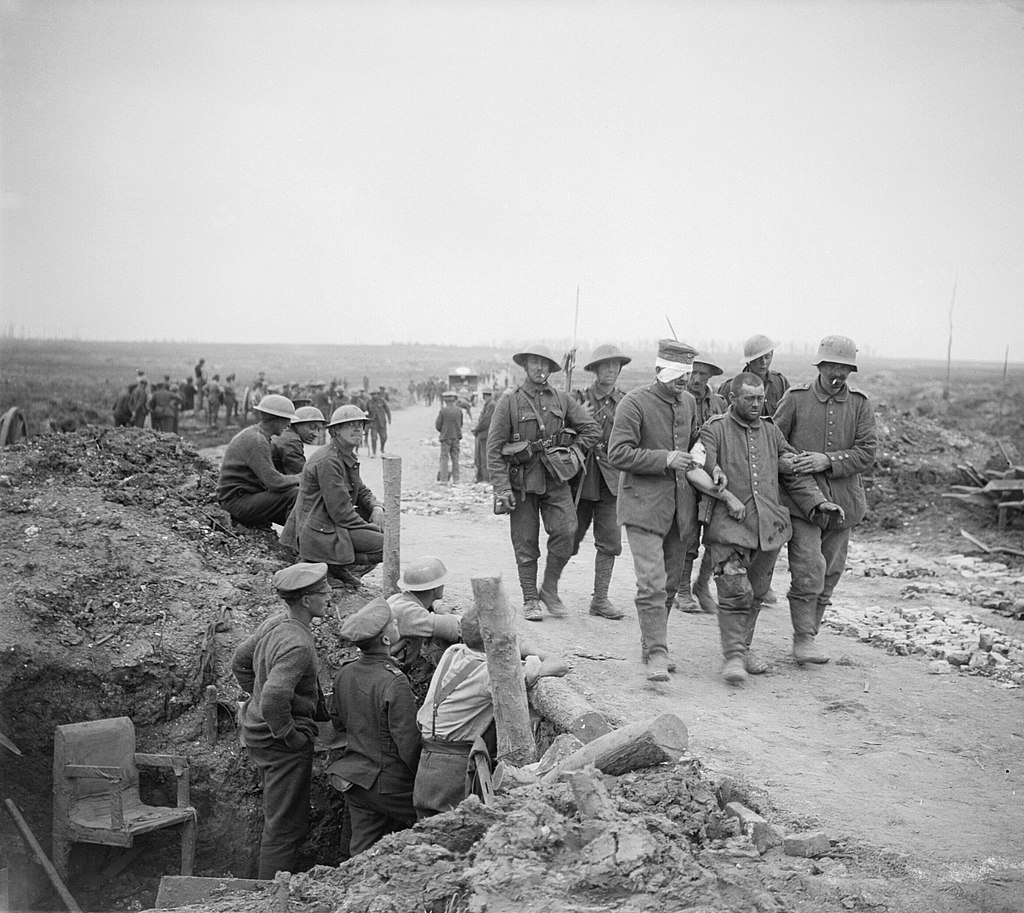
- Foch was then assigned a new role, heading Allied units on the Italian front. Not long after this change, a shift in the French military command structure occurred, and Joffre was replaced in his position of authority.
1917
- As World War I's tactics and politics evolved, 1917 became a year of strategic reevaluation for the Allies. General Robert Nivelle's offensive failure led to the appointment of General Philippe Pétain as Chief of the General Staff, bringing Foch to prominence within the French military's higher ranks. He became chief of the war minister's general staff in May, advising the Allies.
- During this year, Foch advocated a cautious military strategy. He believed that limited strikes and the United States' substantial involvement in France would ultimately shift the balance of the war. While open to deploying heavy guns, he disagreed with British Prime Minister David Lloyd George's plans to send additional French and British troops to aid Italy in its campaign against Trieste.
- The Anglo-French command, with Field Marshal Sir Douglas Haig of the British Expeditionary Force playing a key role, ultimately agreed on the relocation of artillery resources to Italy – reallocating 50 heavy guns from the French army, which, when combined with British artillery, totalled 100 guns sent to assist the Italian front. Despite Foch being the chief of the war minister's general staff, advising was not commanding. Germany could return all its forces to the Western Front, where the Belgians, English and French were under separate commands, while Russia collapsed.
- When the Germans attacked, Foch predicted that the poorly coordinated position would cause each unit to only think about itself and break up the front. He argued in favour of a single command, but David Lloyd George and Clemenceau disregarded his suggestions. Nevertheless, events proved Foch right.
- France's armies had endured monumental losses by the end of three and a half years of brutal conflict with Germany. In the wake of this, the Supreme War Council was formed on 7 November, by the Prime Minister and a minister from each of the Western Front powers, to enhance allied coordination. Military delegates, including Foch, were tasked with aligning their nations' war efforts.
1918
- Foch was a central figure on the executive board formed in January 1918, tasked with overseeing the proposed Allied General Reserve. Despite the underlying resentment from leaders such as Clemenceau and Pétain towards Foch, he and General Pétain made a bilateral pledge to support one another, committing eight French divisions.
- On 21 March, the British front in Picardy came under German attack. Subsequently, British Field Marshal Douglas Haig assessed his embarkation ports, while French General Philippe Pétain focused on Paris. Army separation commenced as a response to the escalating situation. The Germans quickly claimed victory, prompting Lloyd George and Clemenceau to recognise that only Foch could fill the void. He was appointed Généralissime, taking on the rank of Supreme Commander of the Allied Armies. In May, he was appointed commander of the Italian Front and led the Military Board of Allied Supply, ensuring strict and efficient logistical coordination to support the allied forces.
- During the sixth Supreme War Council meeting in June, Foch openly showed his discontent with the decreasing British expeditionary forces, clashing with British Prime Minister Lloyd George over what he perceived as the British government's reluctance to allocate additional troops.
- On 6 August, Foch was elevated to the rank of Marshal of France. In this critical role, he orchestrated the Hundred Days Offensive – a series of massive, coordinated Allied attacks that began on 8 August with the Battle of Amiens. This offensive proved to be a decisive factor in the war, as it caught the German forces by surprise and initiated the sequence of engagements that would lead to the end of hostilities.
- Foch's strategic pressure led to the Allied forces breaking through the Hindenburg Line, causing substantial setbacks for the German military. This ultimately led to the signing of the Armistice of Compiègne on 11 November, which required German troops to retire west of the Rhine and resulted in an end to hostilities on the Western Front.
Criticisms and Disputes
- Recognised as 'the most original military thinker of his generation', Foch was well-known for his insights into Napoleonic and Franco-Prussian conflicts and their relevance to contemporary military actions. Clausewitzian philosophy, which emphasised the necessity of conquest for success, shaped his military strategy.
- Although Foch's lectures reintroduced offensive tactics into French military thought, he was often criticised for his approach. His lectures and writings reintroduced the concept of the offensive into French military doctrine. However, the application of his theories was linked to the disastrous outcomes of early battles in the war, particularly the Battle of the Frontiers in August 1914. The initial French offensives, seen by some as overly aggressive and insufficiently coordinated, led to devastating losses and contributed to a negative view of his strategic principles.
- Moreover, his insistence on continual attacks and his emphasis on morale and the spirit of the offensive were sometimes perceived as uncaring of the realities on the ground and troops' lives. These tactics were part of the broader critique of WWI commanders who were perceived to have been out of touch with the conditions and sufferings of the troops in the trenches.
- Foch has also been criticised for his difficult personality. His stubbornness and tendency to be uncompromising stemmed from a strong sense of conviction in his military judgements, which led to clashes with other military leaders and politicians. The disputes between Foch and both French premier Georges Clemenceau and General Henri Pétain are examples where his interpersonal conflicts had political ramifications.
Post-War Period
- In January 1919, while participating in the Paris Peace Conference, Foch presented a note to the Allied plenipotentiaries, insisting that the Rhine River should serve as the western military border of a disarmed Germany. He firmly believed that the Allies needed to capitalise on their victory by permanently weakening Germany to avert any future threat to France.
- Foch believed that the Allies, with their recent victory, had the power to impose strict peace terms. He noted his concern that England might prioritise maintaining its current gains – the German colonies and fleet – over a strategic, long-lasting peace. He stressed the need for the Allies to have a strategy to ensure their needs were met on the Rhine.
- Despite his forceful advocacy for a demilitarised Rhineland under permanent Allied control, both British Prime Minister David Lloyd George and US President Woodrow Wilson opposed separating the Rhineland from Germany, fearing it would grant France excessive power.
Ultimately, a compromise was reached through the Treaty of Versailles:
-
- Germany had to accept responsibility for causing the war and all related damages.
- Imposed heavy financial reparations on Germany.
- Limited the size of Germany's army and prohibited certain types of weapons.
- Germany lost significant territories in Europe and all of its overseas colonies.
- Banned the union between Germany and Austria.
- Established the League of Nations to promote peace and prevent future conflicts.
- Created a buffer zone between Germany and France.
- Contributed to the creation of new states like Poland and Czechoslovakia.
- Allied occupation of the Rhineland was mandated for a duration of 15 years.
- As a key figure in the negotiations that led to the treaty, Foch had strong reservations about the final terms. He believed it missed an opportunity to permanently weaken Germany and safeguard France's security by not separating the Rhineland from Germany and placing it under permanent Allied control. He anticipated that the limitations imposed on Germany were not stringent enough to ensure lasting peace and prevent a potential resurgence of German aggression.
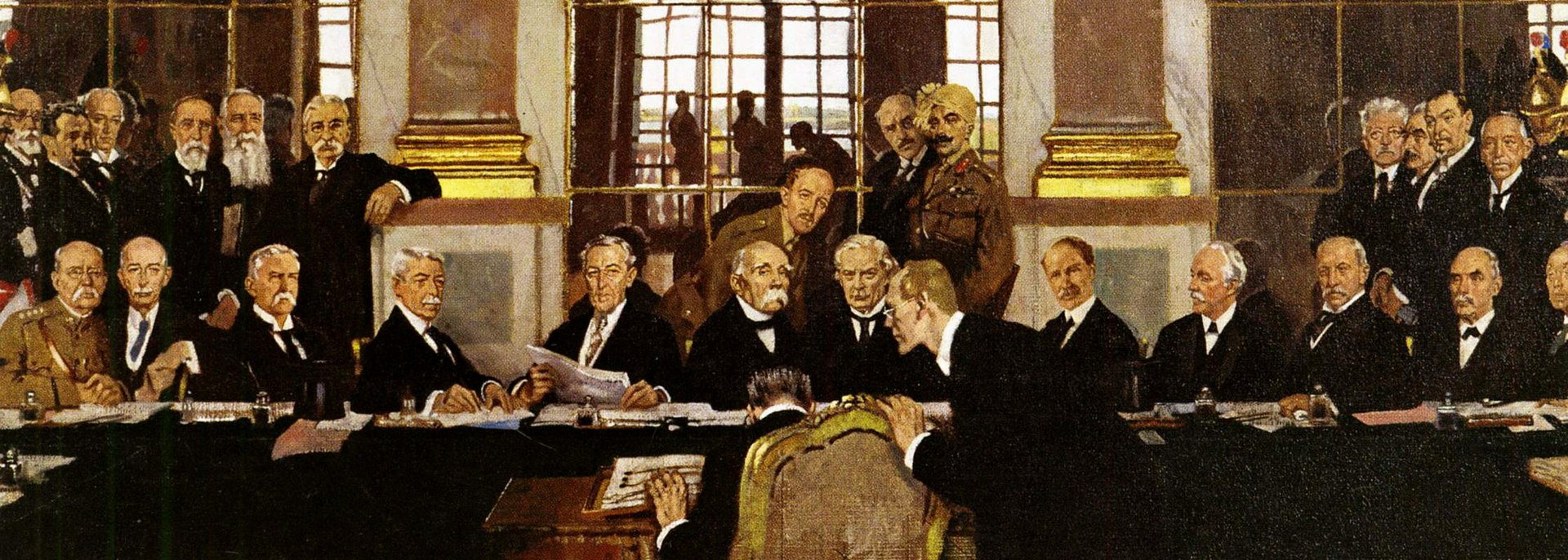
- After the treaty was signed, Foch famously remarked, 'this is not a peace. It is an armistice for twenty years.' His prediction proved to be eerily accurate when World War II broke out in 1939, exactly 20 years after the Treaty of Versailles was signed.
Death
- In 1919, Foch became a British field marshal. In 1923, he was appointed Marshal of Poland for his contributions during the Polish-Soviet War and the Greater Poland Uprising. He also toured industrial centres in the United States and participated in Armistice Day commemorations at Arlington National Cemetery. By 1923, he had retired from a distinguished 55-year career in the French Army.
- Foch's passing on 20 March 1929 led to a nation mourning the loss of a national hero. He was laid to rest at Les Invalides in Paris, where he joined the ranks of France's most venerated military leaders, including Napoleon Bonaparte. Dignitaries from various nations paid homage to the illustrious Marshal of France by attending his funeral.
- To commemorate his role in the Armistice of Compiègne, a statue of Foch was erected at the site, which has become a national place of remembrance. In Poland, a heavy cruiser and an aircraft carrier were named after him.
Image Sources
- https://upload.wikimedia.org/wikipedia/commons/thumb/9/9f/Maarschalk_Ferdinand_Foch_%281851-1929%29%2C_Bestanddeelnr_158-1095_%28cropped%29.jpg/800px-Maarschalk_Ferdinand_Foch_%281851-1929%29%2C_Bestanddeelnr_158-1095_%28cropped%29.jpg
- https://upload.wikimedia.org/wikipedia/commons/thumb/9/9e/The_Battle_of_the_Somme%2C_July-november_1916_Q4172.jpg/1024px-The_Battle_of_the_Somme%2C_July-november_1916_Q4172.jpg
- https://upload.wikimedia.org/wikipedia/commons/thumb/9/96/William_Orpen_%E2%80%93_The_Signing_of_Peace_in_the_Hall_of_Mirrors%2C_Versailles_1919%2C_Ausschnitt.jpg/1920px-William_Orpen_%E2%80%93_The_Signing_of_Peace_in_the_Hall_of_Mirrors%2C_Versailles_1919%2C_Ausschnitt.jpg
Frequently Asked Questions
- Who was Ferdinand Foch?
Ferdinand Foch was a French military commander and strategist who played a significant role during World War I.
- What were Ferdinand Foch's major contributions during World War I?
Ferdinand Foch led the French Ninth Army during the First Battle of the Marne in 1914. Furthermore, he coordinated the Allied counteroffensives during the Second Battle of the Marne in 1918, which marked the turning point of the war. Foch served as Supreme Allied Commander from March 1918, overseeing the final Allied offensives that culminated in the Armistice on 11 November 1918.
- What was Ferdinand Foch's legacy?
He is remembered as a brilliant strategist and leader whose actions helped shape the course of modern warfare.
